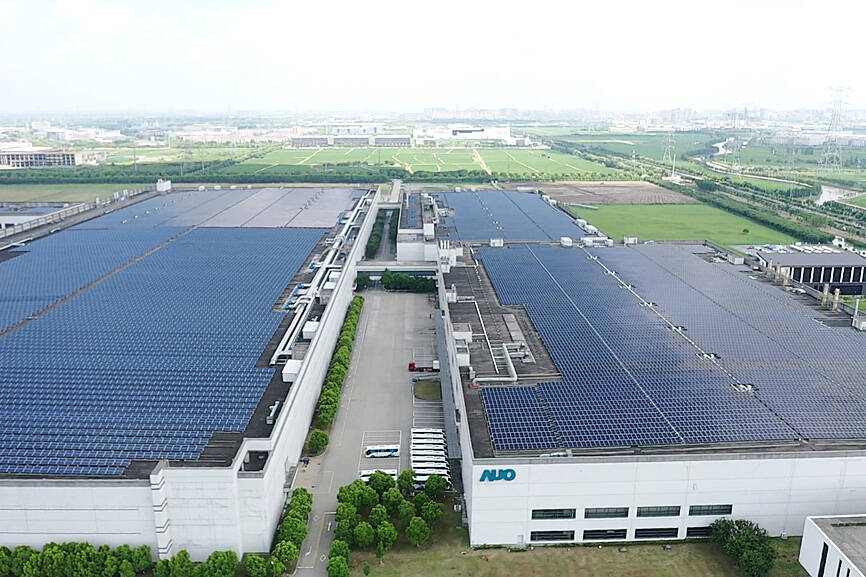Flat-panel supplier AUO Corp (友達) has begun operations of the second phase of its sixth-generation low-temperature polycrystalline silicon (LTPS) LCD fab in Kunshan, China, to increase production of glass substrates.
In a statement, the company said that with the newly added capacity in its Kunshan plant, it would be able to produce more than 40,000 units of glass substrates per month.
When the first stage of the Kunshan plant became operational in 2016, it was the first sixth-generation LTPS flat-screen plant in China and produced Gen 6 glass substrates measuring 1.5m x 1.85m, the company said.

Photo courtesy of AUO Corp via CNA
Second-phase production would roll out substrates for displays used in high-end notebooks, as well as low-carbon, energy-saving and automotive displays and other value-added niche products.
“Kunshan possesses exceptional development advantages, and its complete optoelectronics industry chain with advanced display technology at its core makes it a key growth and development base for AUO,” AUO CEO and president Frank Ko (柯富仁) said in the statement.
AUO has three production bases in China, with the Kunshan complex “serving as its front-end panel production facility and core development hub for the company’s global expansion of LTPS panels,” he said.
The establishment of the Gen 6 LTPS production line would enable AUO to secure a strong market position in products such as mobile phones, notebook computers and automotive parts, he added.
In response to the growing electric vehicle (EV) market, the Kunshan plant has solid technological foundations and could capitalize on the energy-efficient characteristics of LTPS panels to meet the demand for green, energy-saving features in EVs, it said.
Apart from its efforts to turn the Kunshan complex into an efficient 5G smart factory, a distinguishing feature of the complex is a rooftop solar power plant that can now generate 23GWh of power, accounting for 6 percent of the facility’s annual power needs, it said.

Jensen Huang (黃仁勳), founder and CEO of US-based artificial intelligence chip designer Nvidia Corp and Taiwan Semiconductor Manufacturing Co (TSMC, 台積電) on Friday celebrated the first Nvidia Blackwell wafer produced on US soil. Huang visited TSMC’s advanced wafer fab in the US state of Arizona and joined the Taiwanese chipmaker’s executives to witness the efforts to “build the infrastructure that powers the world’s AI factories, right here in America,” Nvidia said in a statement. At the event, Huang joined Y.L. Wang (王英郎), vice president of operations at TSMC, in signing their names on the Blackwell wafer to

France cannot afford to ignore the third credit-rating reduction in less than a year, French Minister of Finance Roland Lescure said. “Three agencies have downgraded us and we can’t ignore this cloud,” he told Franceinfo on Saturday, speaking just hours after S&P lowered his country’s credit rating to “A+” from “AA-” in an unscheduled move. “Fundamentally, it’s an additional cloud to a weather forecast that was already pretty gray. It’s a call for lucidity and responsibility,” he said, adding that this is “a call to be serious.” The credit assessor’s move means France has lost its double-A rating at two of the

AI BOOST: Although Taiwan’s reliance on Chinese rare earth elements is limited, it could face indirect impacts from supply issues and price volatility, an economist said DBS Bank Ltd (星展銀行) has sharply raised its forecast for Taiwan’s economic growth this year to 5.6 percent, citing stronger-than-expected exports and investment linked to artificial intelligence (AI), as it said that the current momentum could peak soon. The acceleration of the global AI race has fueled a surge in Taiwan’s AI-related capital spending and exports of information and communications technology (ICT) products, which have been key drivers of growth this year. “We have revised our GDP forecast for Taiwan upward to 5.6 percent from 4 percent, an upgrade that mainly reflects stronger-than-expected AI-related exports and investment in the third

RARE EARTHS: The call between the US Treasury Secretary and his Chinese counterpart came as Washington sought to rally G7 partners in response to China’s export controls China and the US on Saturday agreed to conduct another round of trade negotiations in the coming week, as the world’s two biggest economies seek to avoid another damaging tit-for-tat tariff battle. Beijing last week announced sweeping controls on the critical rare earths industry, prompting US President Donald Trump to threaten 100 percent tariffs on imports from China in retaliation. Trump had also threatened to cancel his expected meeting with Chinese President Xi Jinping (習近平) in South Korea later this month on the sidelines of the APEC summit. In the latest indication of efforts to resolve their dispute, Chinese state media reported that